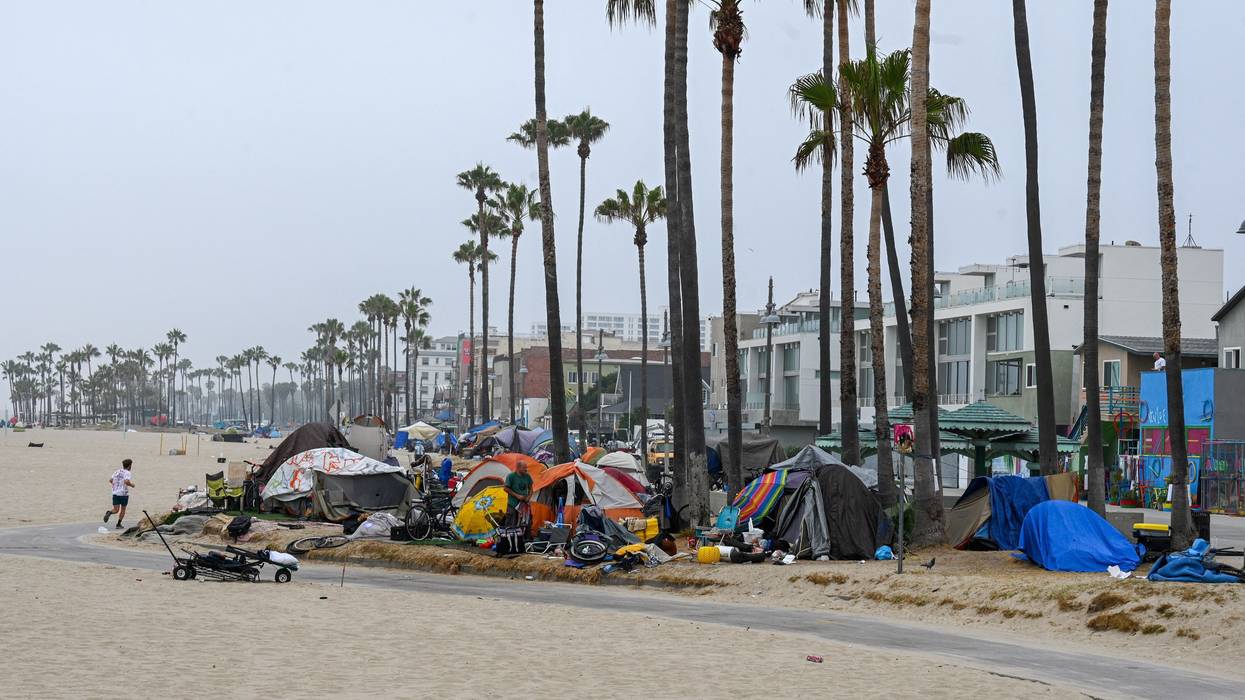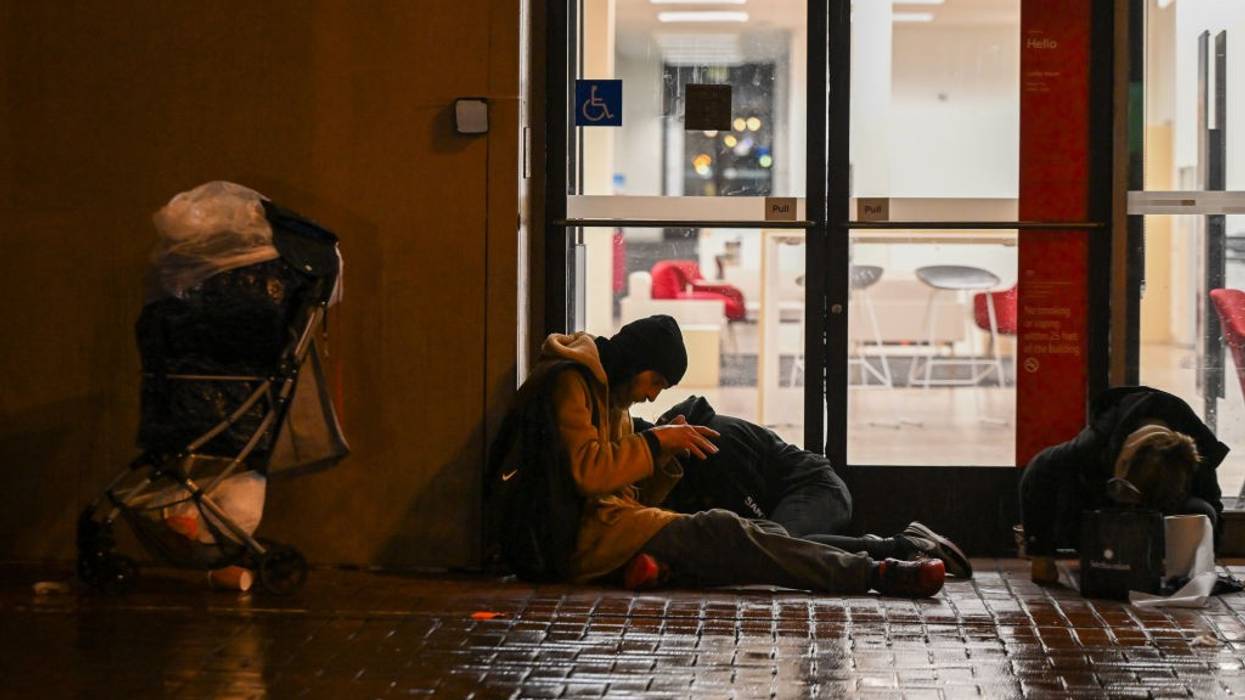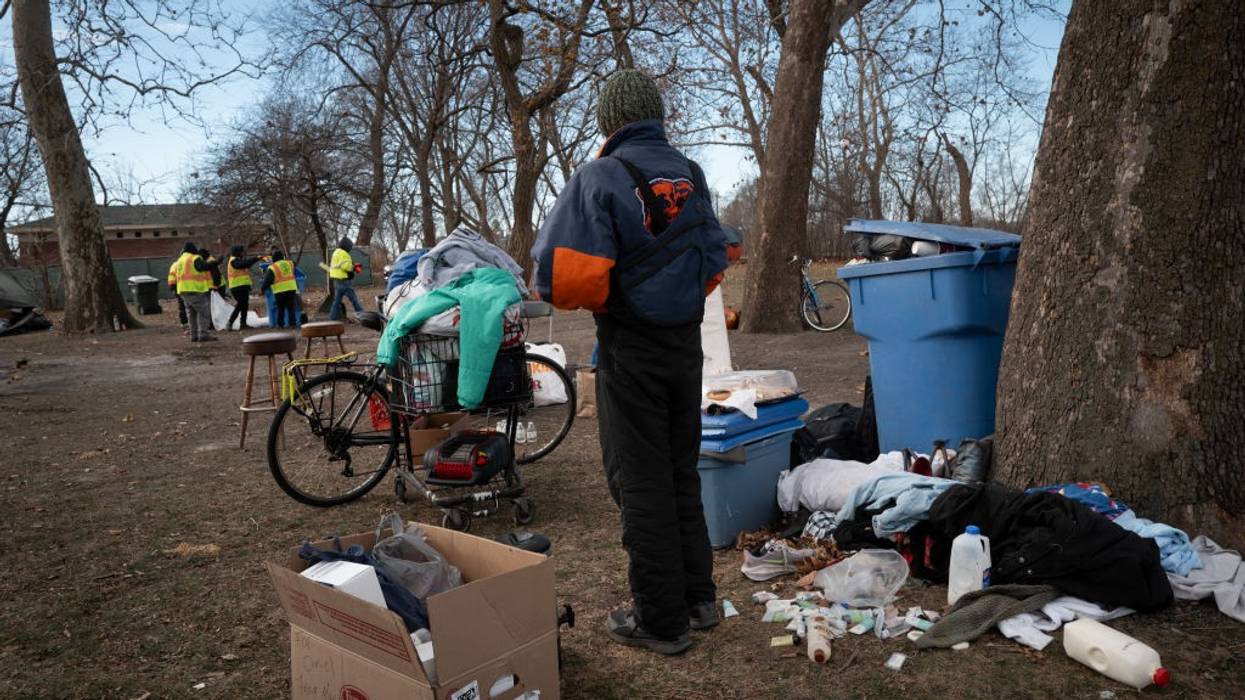Want to Resist Trump? Treat the Homeless With Compassion
If you don’t want to acquiesce to the president’s way of doing things, might it not finally be time to make eye contact with those neighbors of ours who are homeless?
The federal takeover of Washington, DC rightfully attracted extensive media coverage, but an executive order called “Ending Crime and Disorder on America’s Streets,” quietly issued on July 24, received remarkably little attention. Perhaps it didn’t make a splash because it wasn’t specifically about policing (or, for that matter, National Guarding), but more generally about how we should treat people who already exist on the outermost fringes of society, human beings who have long been reduced to labels like “addict” or “homeless.”
Indeed, the Trump administration is counting on us to renounce those living on the streets, while struggling with their mental health or the cost of housing (or both). And if history is any guide, that may be exactly what most of us do. While the current moment may feel shocking in so many ways, the president’s order to end what he’s labeled “disorder” represents a further development of norms that have been in place for all too long. They are also norms that we have the power to change.
Identifying a very real crisis, the president’s July 24 executive order noted that “the number of individuals living on the streets in the United States on a single night during the last year of the previous administration—274,224—was the highest ever recorded.” The order went on to state that the majority of those who are unhoused have a substance use disorder, with two-thirds reporting that they have used hard drugs at some point in their lives. What followed was the administration’s solution: “Shifting homeless individuals into long-term institutional settings… will restore public order.” Precisely which institutions was unclear.
One thing we know is that the use of substances is often connected to past trauma or current hardship, including oppression and poverty. Regardless of that reality, not just the president but all too many of us tend to believe that people who use drugs are undeserving of our compassion or support. In 2021, a national survey found that 7 of every 10 Americans believed that those who use drugs problematically are “outcasts” or “non-community members.” (And yes, those were the terms used.)
The president’s executive order fuses drug use and homelessness into a single issue without revealing that homelessness can cause or exacerbate substance use disorder—because people use drugs to cope with privation. As addiction expert Gabor Maté has said, “Don’t ask why the addiction, ask why the pain.” Much like those of us who reach for wine or social media in order to escape, when people who are unhoused use drugs, they are usually searching for a way to make life tolerable. At the same time, they come to be regarded by their peers as non-community members, making it so much less likely that this nation will fight the president on his plans to round them up and erase them from our world entirely.
Meanwhile, many of us with homes never pause to consider our common habit of avoiding unhoused people in every possible way. We cross the street, shift our gaze, anything to avoid the briefest glimpse of their humanity—perhaps terrified to see ourselves in them. Here’s a thought, though: If you don’t want to acquiesce to the president’s way of doing things, might it not finally be time to make eye contact with those neighbors of ours who are homeless? Might it not be time to acknowledge their humanity and, in doing so, recover some of our own?
“Arbitrary and Prolonged Detention”
The Los Angeles nonprofit LA Más helps residents build security through collective economic power and home ownership. As Helen Leung, its executive director, put it recently: “Families who’ve been in their neighborhoods for generations are getting priced out. Vendors who work multiple jobs are sleeping in their cars. Kids have classroom friends disappear mid-semester because rent went up again.” She noted that immigrants and working-class households in particular are experiencing acute displacement pressure, which ultimately pushes some to become houseless—and now they find themselves in the crosshairs of the president’s July executive order.
That order proposes the vast expansion of a practice that has been around for a very long time. In recent years, in fact, in states across this country, there has been an uptick in involuntary commitment, a trade term for the forced institutionalization of people who are unwell—or, now, simply unhoused.
Evidence suggests that rounding up masses of unwell people and institutionalizing them will do anything but benefit public safety, while endangering the individuals who are locked up.
Elected officials of all political stripes, including the current president, have claimed that involuntary commitment is an evidence-based way to treat mental illnesses, including addiction. Research does show that, in certain cases, involuntary commitment can be beneficial. But in all too many cases, it’s both ineffective and inhumane. A recent report by the Federal Reserve Bank of New York found that the institutionalization of individuals who were involuntarily hospitalized in “judgment call cases”—meaning cases where one physician might recommend hospitalization, while another would not—nearly doubled the risk of death by suicide or overdose. It also nearly doubled the likelihood of that person later being charged with a violent crime, perhaps because such institutionalization disrupted employment, subjecting people to still more dire economic circumstances. (Again, don’t ask why the addiction, ask why the pain.) Even a recent essay in the New York Times advocating forced treatment conceded that it must be well funded and thoughtfully carried out—conditions that are virtually certain to be unmet in the current climate.
In other words, evidence suggests that rounding up masses of unwell people and institutionalizing them will do anything but benefit public safety, while endangering the individuals who are locked up. On-the-ground data also indicates that, even before US President Donald Trump focused on that tactic, such commitment was unequally applied, with Black and Hispanic people more likely than White people to be institutionalized against their will.
“We’re not operating with an optimal treatment system, mandatory or voluntary,” according to Regina LaBelle, director of the Center on Addiction Policy at Georgetown University and the former acting director of the White House Office of National Drug Control Policy. “We’re starting from a really bad system. And so pushing people into a really bad system will end really badly.”
In response to the president’s executive order, the American Bar Association published a statement saying that it raises grave constitutional and civil rights issues and “paves the way for arbitrary and prolonged detention.”
Housing Is a Human Right
A response to the president’s executive order, published in the Psychiatric Times, a journal for psychiatry professionals, noted that it “invokes fear of people with psychiatric illnesses, talks of indiscriminate incarceration of people who have not committed a crime, as well as collection and sharing of sensitive health information with law enforcement, and yet proposes no actual solutions.”
Unfortunately, the president and his crew undoubtedly do regard the involuntary commitment of unhoused people as an “actual solution.” Indeed, many people who have homes or apartments feel unhappy at the sight of human beings living on the streets of their neighborhood and want something done about it. But the underlying problem isn’t that people live on the street or use substances in public in order to tolerate despair. As Helen Leung put it, “When someone loses their housing, it’s not because they need to be institutionalized—it’s because we’ve allowed housing to become a commodity instead of a human right.”
“What works best is making sure that we have affordable housing for people,” says LaBelle. New research out of Philadelphia, for instance, found that a program of cash assistance for housing costs more than halved the odds of participants becoming homeless.
But our prevailing housing system—in which the purpose is less to provide shelter than to generate profits for those who own real estate—has resulted in rents or costs that are beyond reach for increasing numbers of Americans. And as if such a state of affairs weren’t bad enough, President Trump now plans to make “alternative” investment assets, including real estate, available to anyone with a 401(k). If he succeeds in doing so, far more people will compete to own real estate for the purposes of turning a profit, which will undoubtedly raise real estate prices yet more, driving rents higher still.
Notably, his July 24 executive order provides law enforcement with the vague instruction to institutionalize people who “cannot care for themselves,” which could result in a kind of real estate roulette. In essence, those who lack the cash to pay for housing at market rates—no matter how high those rates rise—could be deemed unable to care for themselves, and therefore would become eligible to be rounded up and taken… where?
Very Much Precedented
On one matter there is widespread agreement: There’s already a distinct shortage of mental health services, especially for those who can’t pay for them.
“Our current system does not provide for long-term institutionalization,” noted the Psychiatric Times in its response to the president’s executive order, which itself does nothing to expand the inpatient capacity of treatment facilities or increase funding for mental health services. The administration actually slashed funding for such programs this spring and has approved cuts to Medicaid, a program that currently funds 24% of all mental-health and substance-use care in the United States.
It’s easy to blame Trump, but far harder to engage in self-reflection: How have I participated in the dehumanization of unhoused people or those who use drugs?
So where will people be taken? Health and Human Services Secretary Robert F. Kennedy Jr. has proposed rural camps for addiction recovery, but that (controversial) policy would require substantial new funding, rather than cuts, to healthcare. The president and Congress do seem to have an appetite for increasing funding for military and enforcement programs. The hastily constructed immigration detention facility in Florida known as “Alligator Alcatraz” offers a nightmarish example of how this administration pursues the development of new carceral space.
Already, immigrants are being rounded up and institutionalized, a practice likely to be expanded to still more of our neighbors. While all of this may feel unprecedented, it’s all too precedented. This nation has a long history of institutionalizing people who have not committed a crime, including Indigenous people and those with mental health struggles. It’s easy to blame Trump for all that’s now happening, and he certainly bears enormous responsibility, but he’s not responsible for everything.
He is not, for example, responsible for the longstanding and pervasive stigma attached to people who are unhoused or mentally unwell or both, which has pushed all too many of us in the wealthiest nation on Earth to live in isolation and poverty and even to perish. It’s easy to blame Trump, but far harder to engage in self-reflection: How have I participated in the dehumanization of unhoused people or those who use drugs? Do I have the capacity to recognize the humanity in everyone without exception?
ICE (Like Stigma) Now Operates in the Shadows
Perhaps it seems that acknowledging the humanity of those who have so long been dehumanized is far too little and too subtle to make a difference now. And it’s true that we need much more than that, including strong collective action to create housing that people can afford and that’s accessible to those who have experienced addiction and criminalization. But it’s also true that nonjudgmental support from peers makes a difference in the lives of those who are struggling, raising the odds that they may heal and go on to live fruitful and connected lives.
In the past half-year of Donald Trump’s second term as president, raids by masked US Immigration and Customs Enforcement (ICE) agents have become a fixture of American life. ICE now operates in the shadows—and that’s how stigma works, too. Stigma toward people who use drugs or who live without homes is a corrosive force that makes it acceptable to withhold compassion, care, and connection from certain of our neighbors. But unlike forces equipped with military-grade tactical gear, stigma can be overcome by any individual who chooses to witness and affirm the humanity of all our neighbors. And in our present American world, doing so is surely a revolutionary act.


